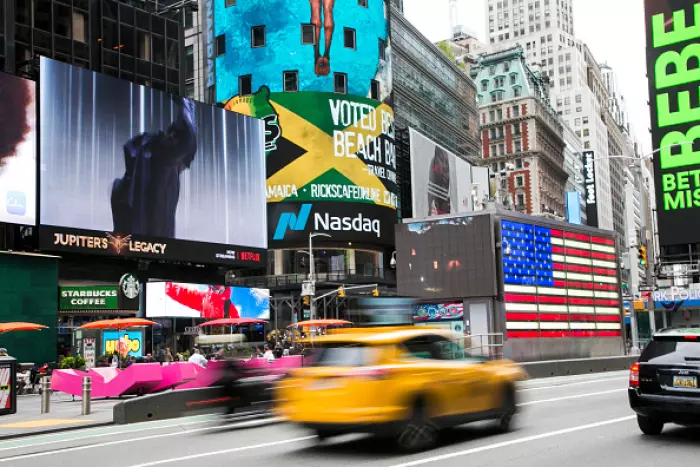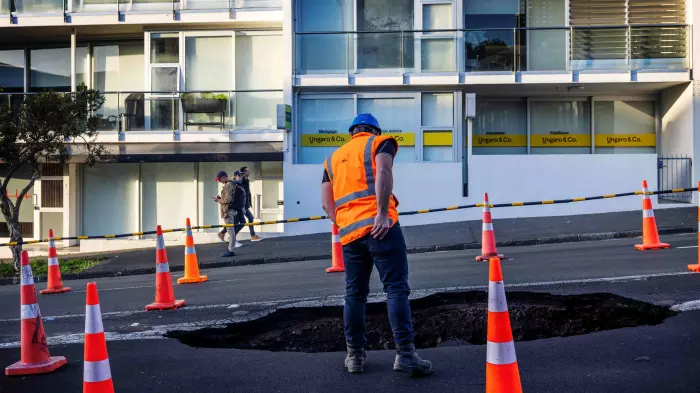Summary: US stocks jumped 2-3% this morning on renewed confidence omicron won’t be too disastrous, but may slow the global economy enough to avoid fast Fed rate hikes. Investors also hope ‘Team China’s’ moves to stage a controlled implosion of Evergrande work to avoid any contagion effects. Also, it’s reported Ashley Bloomfield advised Cabinet late last month Auckland could drop its borders from Dec 3, rather than Dec 15.
We’re back baby The S&P 500 surged 2.2% and the Nasdaq was up 3.1% by 7.45am NZT as buyers of last week’s dip grew in confidence and fears about omicron and a Fed tightening faded. Omicron is seen as a good news/bad news situation, with travel bans and lockdowns expected to slow economic growth, but also reduce the urgency for higher interest rates. Also, there was fresh news overnight that treatments that work for delta also work for omicron. GlaxoSmithKline said its monoclonal antibodies treatment was effective against all strains of the omicron variant, based on new data. (CNBC)
Team China’s response There’s also hope a coordinated response from China’s state-owned banks, the central bank and local governments would mean the likely collapse of Evergrande would be a controlled implosion rather than a super spreader event in financial terms. Three official bodies issued statements on how they were controlling the windup of the world’s most indebted property developer, followed by a monetary policy easing from the People’s Bank of China. Hong Kong-listed shares in other Chinese developers bounced overnight. Stronger than expected Chinese export and import figures also helped. (NY Times)
Are you on mute? US President Joe Biden talked for just over two hours with Russian president Vladimir Putin via a video link this morning amid growing US warnings Russia could invade Ukraine early next year. Biden was reported to have warned Putin in the video chat that Russia and its banks would be hit by sanctions stopping money transfers if there was an invasion. (Reuters)
Auckland could have opened earlier The NZ Herald’s Derek Cheng reports this morning from internal documents that Ashley Bloomfield advised the cabinet on Nov 24 he would have been fine with an earlier opening of the Auckland border than Dec 15 and an immediate move to ‘green ‘ for the rest of the country. In the end, PM Jacinda Ardern decided to be more cautious and delay Auckland’s opening by 13 days from last Friday’s move nationwide to the traffic light system known as the Covid Protection Framework.
‘We can open up at the same time’ Bloomfield advised the ‘hard or enforced’ boundary around Auckland should be removed when the rest of the country goes into the traffic lights system. “There will be no public health justification to maintain a boundary around Auckland under the (Covid Protection Framework) CPF. Put another way, the boundary around Auckland has served its purpose. It has been effective, alongside other public health measures, in greatly reducing the risk of the virus 'escaping' Auckland,” Bloomfield was quoted as saying in the advice, which was included in an affidavit to the Waitangi Tribunal on whether the covid response breached treaty rights.
Vague bank merger talk Fresh talk of merger discussions between two of Australia’s big four banks has emerged in Australia. The Australian newspaper reported this morning there had been discussions rumoured between two of the three smaller banks in the big four – ANZ, NAB and Westpac. CBA is now well clear of its rivals and seen as too big to be allowed to buy one of the other four. NAB owns BNZ and CBA owns ASB here. Bank analysts remain sceptical any of the big four would be allowed to merge, given the ‘four pillar’ policy in place informally since the early 1990s.
Hawkish reception The Reserve Bank of Australia reiterated it plan to keep its quantitative easing programme going into next year and gave no indication of a rate hike before 2023, but a slight tweak in the language prompted bond traders there to push up wholesale interest rates 10-15 basis points because it was viewed as slightly more hawkish.
Dairy prices rise Prices rose 1.4% in Global Dairy Trade’s auction of dairy products overnight, helping to lift milk payout futures closer to the $9/kg mark for this season. Oil prices rose another 4% overnight to US$76/barrel on hope Chinese government support for its property development sector would boost demand for steel. Iron ore prices rose too on those hopes. The NZ dollar remained just above its one-year lows of 67.5 USc, nudging higher with other commodity currencies to 67.7 USc by 7.45 am.
Fresh on BusinessDesk this morning
No worries Jenny Ruth reports the Reserve Bank’s latest stress test of the ability of New Zealand’s banks to handle an 11.8% unemployment rate and a 39% fall in house prices found they could cope just fine, emerging with more than double the minimum capital required.
Robot watchdog? Henry Burrell reports Salesforce saying the government needs to appoint a 'chief ethical and humane use officer' to keep an eye out for AI bias.
Cheap at the price? Brent Melville finds a new luxury Shelly Beach Rd development in St Marys Bay is selling apartments for north of $8m.
Bad bank, good bank David Chaplin writes in his column this week about whether bank regulation can spot bad banks, and also find the non-banks springing up that are also bad.
ICYMI yesterday
Pay TV pays SkyTV shares rose 17% yesterday after it lifted its profit guidance by 90% because of significant cost reductions. The NZX50 rose 0.1%. (BusinessDesk)
Crypto-laundering The FMA warned about the high risks cryptocurrencies and derivatives markets present for money laundering and terrorist financing. (BusinessDesk)
Us too please Fletcher Building launched a retirement living business with plans to build villages in Auckland, hoping to profit from the same property valuation gains behind Metlifecare, Ryman and Avida. (BusinessDesk)
Race to the ferry KiwiRail’s unions called off strikes planned for the week before Christmas after they received a new pay deal. (BusinessDesk)






